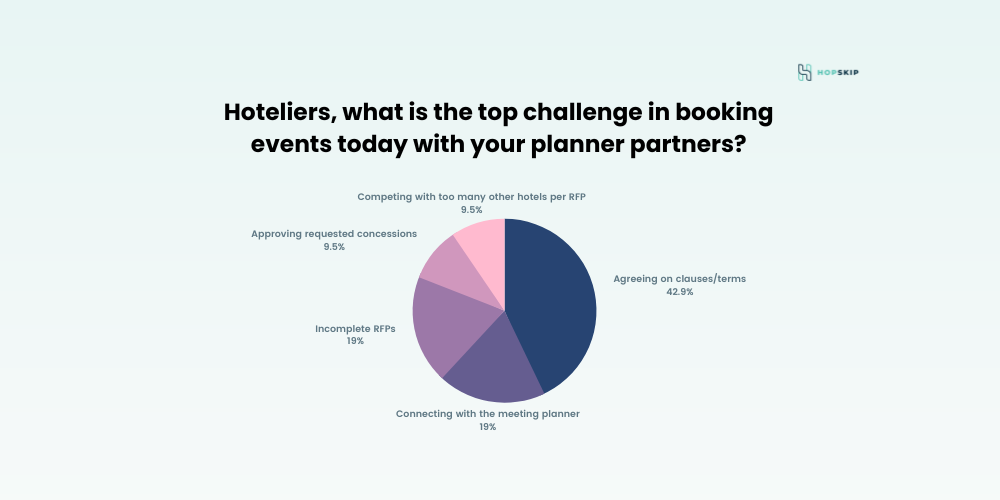The top challenge hotels face when booking events today with meeting planners
Hotels and meeting planners, learn how to overcome the hurdle of agreeing to hotel contract terms for your business meetings and events.

HopSkip recently asked over 100 hoteliers what their top challenge is in booking events today. 43% of hoteliers responded with “agreeing on contract terms with the planner.” This is a clear indication that there is a disconnect between hoteliers and planners when it comes to negotiating contracts. In this blog post, we will explore the reasons behind this disconnect and offer some suggestions for overcoming it.
Reason #1: Planners are not always familiar with the industry jargon, and terminology hoteliers use, making it difficult to understand what they agree to. Furthermore, planners often work with multiple hotels at once and may not have the time to review each contract thoroughly. As a result, they may inadvertently agree to terms, not in their best interest.
Solution: Educate and communicate. Someone who isn’t an attorney or a hotel salesperson that is responsible for regularly working with contracts, trying to wrap your head around all of the legal terminologies can be an overwhelming task. Planners and hotels must communicate and confirm any assumptions or questions with the contract upfront during the RFP and proposal process. By taking the time to educate and communicate, both hoteliers and planners can work towards a more seamless contract negotiation process. This will ultimately result in improved relationships and better overall events for all parties involved.
HopSkip, in partnership with two of the best industry attorneys, has created the HopSkip Contracting Academy to solve this exact challenge. Planners and hotels now have a place to get educated on the top hotel contract terms and clauses they should be aware of for their next meeting or event.
Reason #2: It’s not uncommon for planners to request certain contract terms AFTER they select their hotel for their event, which can create unwanted surprises when it comes time to review and sign the hotel contract. And, if changes need to be requested, make sure to communicate them early on in the process rather than springing them on at the last minute.
Solution: Planners should communicate their requested contract terms and clauses when they send the hotel their event RFP (Request For Proposal). This will allow the hotel to review and negotiate contract terms before signing rather than requesting them at the last minute.
HopSkip's meeting and event booking platform makes it easy to standardize hotel contract terms across your events. HopSkip empowers planners to easily request approval for their contract terms during the RFP process to eliminate any surprises when executing contracts.
Conclusion:
Overall, hoteliers and planners must be proactive and communicate openly about their contract needs and expectations to avoid confusion or disagreement during the contract negotiation process. By educating ourselves on industry terms and standardizing our contract terms, we can work towards creating a smooth and successful contracting process for all parties involved.
So if you're looking for a way to standardize your hotel event contracts and streamline your contract negotiations, sign up for HopSkip for free! Happy contracting!